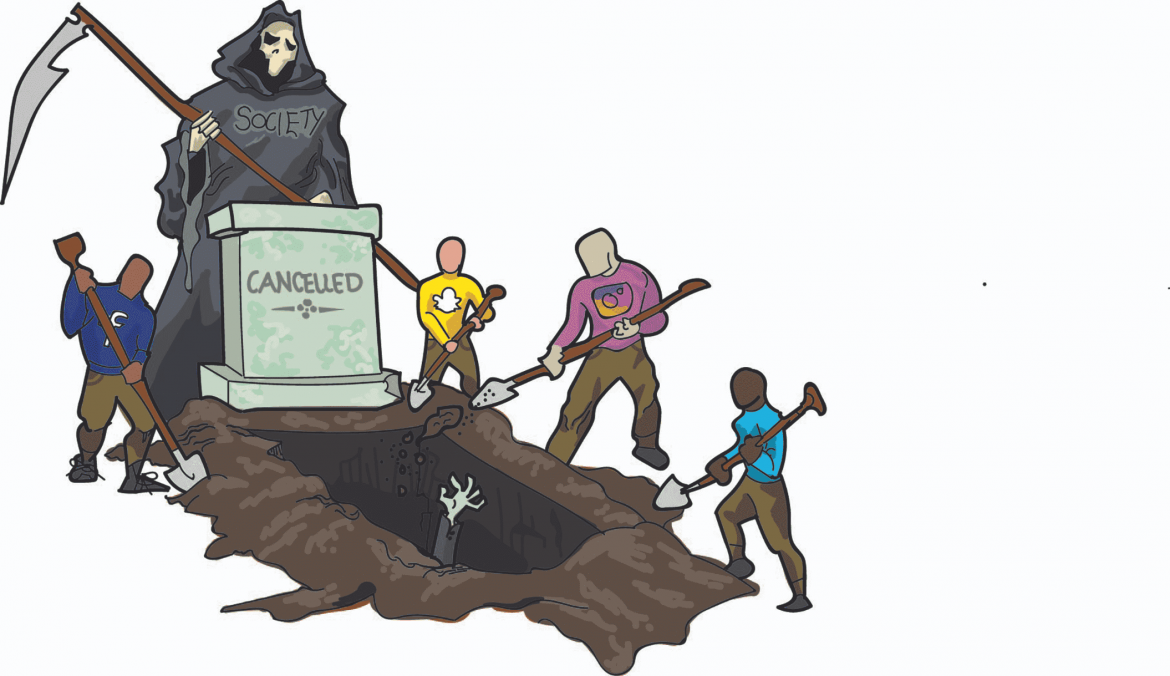Various forms of social media are depicted burying a “canceled” person as society watches approv- ingly. Cancel culture is not a productive way to handle celebrities’ mistakes. Photo illustration by Lilli Sams
With the share of a post, tweet or hashtag, an entire career, friendship or reputation could be ruined. However, this isn’t the best way for the public to address celebrities’ mistakes.
From a young age, many are taught the basic concept of “forgiving and forgetting.” Whether it is in response to a peer saying something offensive, acting without thinking or simply hurting another, the common lesson is to acknowledge the mistakes, learn from them and grow.
However, in today’s day and age, that’s not always what happens — oftentimes, celebrities are immediately shunned by the public or “cancelled”, failing to allow these figures to accept responsibility and truly understand where they went wrong.
According to Dictionary.com, to cancel something is “to make void; revoke; annul.” And that’s exactly what society is doing. In response to celebrities’ faults, the public is disregarding all of their actions to pronounce them no longer influential.
Following the mistake of a celebrity or average person, millennials and GenZ have begun turning
to social media and trending messages to pronounce wrong-doers “cancelled”, ultimately depriving them of the chance to own up to their mistakes.
But is failing to give friends, acquaintances and celebrities the opportunity to acknowledge their missteps truly the right step for society?
At the Obama Foundation 2019 summit, former president Barack Obama addressed this practice commonly known as “call-out” culture.
“That’s not activism. That’s not bringing about change,” Obama told the audience. “If all you’re doing is casting stones, you’re probably not going to get that far. That’s easy to do.”
When inappropriate rumors about famous YouTuber James Charles’ past surface, when rap artist Kanye West posts inaccurate and racist statements or when rapper Azealia Banks calls other artists malicious names, turning to the newest trending hashtag or tweet to handle the issue is simply not the answer.
People make poor decisions, some more severe than others. Most of the time, these mistakes should not go unpunished, but there should always be a proper conversation and acknowledgment of the issue for others to live and learn from.
American actor Kevin Spacey was a famous producer and singer, commonly known for his role in numerous movies and shows, including “House of Cards” and “Baby Driver”. In 2017, multiple people came forward accusing Spacey of sexual assault.
Spacey’s actions are far more complex than the “forgive and forget” society preaches. The severity of the actor’s decisions took a toll on his entire career and reputation, as they should. Spacey was kicked off the cast of “House of Cards” and lost his role as executive producer for the show. In addition, Netflix cut off all ties with him.
In spirit, Spacey was cancelled after he was accused of sexual assault. However, the nature of this cancellation is different than the quick and overzealous cancelling nature of social media and Hollywood.
Online users should never attack others for their mistakes, no matter how severe. Using social media to address these problems is impractical, and it is vital for people to learn to criticize others without “cancelling” them, except in extreme cases, such as Spacey’s.
It is naive to expect a singular apology to redeem an entire career. Those at fault should suffer whatever consequences they deserve, but in a mature manner. This will set an example for impressionable youth and the general public about how to handle these serious issues.
